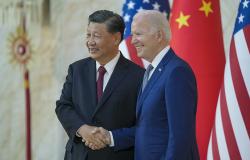China and G20 Summitry: A Multilateral Agenda in Bali, New Delhi and Beyond?

Guest blogger Gregory Chin, Mayling Birney Global Scholar and Associate Professor in the Department of Political Science at York University, discusses China’s approach to the G20 Bali Summit and suggests that there was an important multilateral agenda to China’s meetings.
Days before the start of the G20 Bali Summit, I was interviewed by a notable New York Times reporter about how China was approaching the G20 Summit in Bali, Indonesia. We discussed how the remarks by CPC General Secretary Xi Jinping at the recent Party Congress could play-out at the G20 Leaders Summit in Bali. Of particular interest were Xi’s dual statements that China is facing a more difficult period of global struggle and uncertainty, and his call for China to further step up in the world to cope with the deficit in global governance and be more active in promoting its lessons learned in international development and global security.
For the media, the key story at the G20 was not the group agenda, but rather the bilateral meeting between the Presidents of the United States and China on the sideline of the Summit. It is understandable that attention was given to the bilateral meeting, but I would suggest there were also important multilateral elements to China’s approach to the G20 Bali, and they will carry over beyond the November 2022 G20 Summit. Insufficient attention has been given to China’s multilateral agenda and how it intersects with the bilateral, and how it matters.
The G2 Returns
We now know the Biden-Xi meeting happened. Insider-commentators from the two principals, and other observers in the G20 felt the meeting was important for breaking the ice, for renewing personal contact between the leaders of the two most powerful nations in the world, particularly important for registering their key messages, in person, especially their respective redlines. For Beijing, the major redline remains the Taiwan issue and the US not stoking separatist forces on the island; for the Biden administration, insisting that China not back Russia militarily. Both sides condemned any talk about nuclear weapons in the Russia/Ukraine conflict, let alone their use. The main breakthrough was their agreement to recommence their bilateral cooperation on global climate change mitigation efforts, a positive for everyone.
Forward-looking global thinkers ask whether China and the US can find in the G20 a useful forum to develop new ways of engaging each other, in the presence of other impactful nations.
My answer is that while I would hazard to guess about the US, there is a pattern of consistency in China’s approach to the G20: China has made sure to keep a focus on its ‘G2’ relationship with the US for each and every G20 summit. Furthermore, I would argue that the G20 Summit has become more important for China’s leaders because it is now the only informal leaders meeting where the government decision-makers for a broad range of globally-impactful nations (including Russia) are still together in one room, and where, in theory, they can address the most pressing global issues. Beijing thus has strong motivations to develop ways to engage the US in front of the others, as a ‘G2’ within the broader grouping.
Multilateral Agendas
Despite all the media attention on the bilateral meetings, what should not get lost, especially for those who are serious about studying the International Relations of China, is that Beijing also brought a deeper multilateral agenda to Bali; and one that is multi-layered, multi-year, and has at least three main dimensions.
First, China looked to help the Indonesian hosts to deliver a ‘successful’ G20 Summit. This meant helping the Indonesians to ensure that the broader global agenda – the issues that matter to the entire world, developing and developed – was not completely lost to the drumbeats of war in Europe.
The Indonesian hosts had rightfully (i.e. understandably and legitimately) placed global health coordination, digital transformation, and sustainable energy transition at the core of the agenda for Bali. It was their prerogative as the G20 host presidency to decide the specifics of the summit agenda for the cycle-year.
However, in Bali, the main obstacle to the global developmental agenda was the preoccupation of the G7 and NATO nations to push for the G20 nations to jointly condemn Russia for the fighting in Ukraine. For many of the Asian, African and South American nations, the war in Europe feels remote. These regions register the European warfare mainly as damage to the world economy and to their hard-earned development food and fuel prices rise. Their main concern at the G20 was to secure sustainable development and continued growth, to address the effects of climate change and the costs of mitigation, and to contain the COVID-19 pandemic.
It became the unstated goal of the Indonesian hosts to ensure that the Western nations did not completely derail the efforts of the hosts to salvage what they could of the broader global agenda.
China supported the Indonesians on the broader global agenda, and at the conclusion, the hosts could declare that a number of global principles and some global measures were agreed in Bali. Under global health, the G20 welcomed the establishment of a new financial intermediary fund for pandemic prevention, preparedness and response (the ‘Pandemic Fund’) to be housed at the World Bank. Under the digital transformation, and world economic recovery, G20 leaders agreed to a number of commitments in principle, though no new tangible financial commitments were made to support the realization of the declarations.
Second, China’s engagement of Indonesia at the G20 summit was also tied to Beijing’s interests in an Asian regional agenda, with Indonesia taking over Chairing the Association of Southeast Asian Nations (ASEAN) summit in 2023. President Xi, at his bilateral meeting with the Indonesian President Joko Widodo, immediately before the G20 Summit, confirmed that China would give its “full support” to Indonesia’s chairmanship of ASEAN in 2023.
China and Indonesia issued a joint statement pledging further bilateral/regional cooperation. China (and Indonesia) agreed to implement the “consensus between China and ASEAN” to “uphold open regionalism” and advance the China-ASEAN Comprehensive Strategic Partnership. Indonesia endorsed “China’s vision to build a peaceful, safe and secure, prosperous, beautiful, and amicable home in the region.” China, together with Indonesia, agreed to promote “mutually beneficial cooperation to implement the ASEAN Outlook on the Indo-Pacific”, marking a strategic channel for China to deal with the coming wave of new US-led Indo-Pacific initiatives. Importantly for Beijing, Indonesia agreed with China to promote “mutually beneficial cooperation” to further “synergize the BRI and the Master Plan on ASEAN Connectivity 2025”, and to work closely together for the “effective implementation” of the Regional Comprehensive Economic Partnership (RCEP) where China and Indonesia are prominent members of the new regional economic agreement.
Third, China kept an interested eye on the future G20 hosting of three BRICS (an acronym for five leading emerging economies, Brazil, Russia, India, China, and South Africa) countries, with India hosting the G20 Summit in 2023, Brazil in 2024, and South Africa in 2025.
The Indonesian hosts were very aware that they were handing-off the G20 host presidency to a succession of ‘BRICS’ nations.[i] At the various gatherings in the lead-up to the Leaders Summit, such as the T20 summit (think tanks summit), W20 (women’s summit) and Y20 (youth summit), the Indonesian hosts tried to coordinate the discussion of next steps, future directions, with representatives of the respective BRICS nations.
Modi’s Plans for G20 New Delhi
India does not officially assume the G20 presidency until 1 December 2022. But the Narendra Modi-led government has already set the dates for the summit, September 9 and 10, 2023, and New Delhi as the site. At the closing ceremony in Bali, Prime Minister Modi pledged that India would strive to ensure that, under India’s lead, the G20 will act as a global “prime mover” to envision new ideas and accelerate global collective action over the next year.
The Indian leader acknowledged that “India is taking charge at a time when the world is grappling with major geopolitical tensions, economic slowdown, and rising food and energy prices, and the long-term ill-effects of the [COVID-19] pandemic.” Modi said, “at such a time, the world is looking at the G20 with hope”, and he promised that India’s G20 will be “inclusive, ambitious, decisive and action-oriented.”
It would be in China’s interests to engage New Delhi about the next G20 summit and to offer its support when considering that previous summits (BRICS and bilateral) have been useful platforms for Xi and Modi to stabilize China-India relations. If the two can work together with the other BRICS members to shape a collective agenda for the next three G20 summits, they could actually provide a degree of continuity in the G20 process and agenda, which could lead to some substantive results and give new relevancy to the G20 process.
For Beijing, however, engaging New Delhi is always challenging. In Bali, at their first public exchange since the India-China standoff in 2020, Xi and Modi shook hands and had what appeared to be a convivial, courteous and relaxed greeting at the conclusion of dinner on the first evening.
If Beijing tries to engage India about the next G20, the issue is the degree to which the Modi-led government is open to engaging China. Indications are that the Modi government will use the summit as a geopolitical opportunity to showcase India’s potential leadership role in global governance; to feature India as a future-oriented, tech-savvy, reliable economic powerhouse in the world; and to shore up Narendra Modi’s stature as a global statesman.
Any efforts by China to engage India on the upcoming G20 New Delhi summit will also bump up against the Modi government’s domestic agenda, specifically its plan to organize more than 200 G20-related events across the country, in major cities including Delhi, Chennai, Kolkata and Mumbai, during the year-long period as the G20 host presidency, which commences in December.
Weeks prior to the recent G20 Bali, Prime Minister Modi went ahead to announce his plan for India’s G20 presidency in 2023. Modi emphasized that the theme for the G20 New Delhi would be synchronized with the main themes of his government’s foreign policy.
In Bali, Prime Minister Modi spelled out some of the details, declaring the ‘digital transformation’ will be a core theme for the New Delhi summit, touting it as the “most remarkable change” of this era. This element builds on the Bali agenda. The Indian Prime Minister said the benefits should reach everyone, and declared that, “during its G20 Presidency next year, India will work jointly with G20 partners toward this objective.” The principle of ‘data for development’ will be an integral part of the overall theme of India’s G20 Presidency, ‘Vasudhaiva Kutumbakam’, or ‘One Earth, One Family, One Future.”
Modi added, “digital solutions can also be helpful in the fight against climate change. As we all saw in the examples of remote-working and paperless green offices during the COVID-19 pandemic.” In principle, Beijing would agree with Modi’s emphasis on digital solutions, but the desire of the Indian authorities to keep China’s leading digital technology companies out of India would make it difficult for Beijing to engage on digital transformation.
Modi’s “no war” message at the G20 Bali will be easier for Beijing to embrace and to get behind. It also helps with reducing geopolitical tensions between the Asian giants.
Lula, BRICS, and Climate G20
One can imagine that the return of Luiz Inacio Lula da Silva presents China with a diplomatic opportunity, and that Beijing will want to work again with President Lula da Silva to advance a shared agenda for the G20 and BRICS.
In his previous terms as President, Lula made serious efforts to cooperate with the BRICS grouping, and particularly China, sometimes even at a domestic political cost. It would be strategically important for China to support the Brazilian agenda for 2024.
Speaking at a side presentation at the COP27 meeting, Lula promised to put climate action and protection of the Amazon at the heart of his government’s domestic and international agenda. Brazil’s President-elect stated that when Brazil chairs the G20 summit in 2024, climate will be at the top of the agenda, the priority for the G20 2024. Lula called-out the wealthy nations of the world to deliver on their pledges at COP15 that stem from Copenhagen 2009, and he criticized world leaders for ignoring warnings about climate change and spending “trillions of dollars” on wars “that only result in destruction and death.”
Beijing will have no hesitation coming on board with Lula’s criticism of war and destruction in Europe. One can also expect that China will support Lula’s climate agenda, given the attention to environment inside China, and globally, under Xi’s leadership, and equally important, due to Lula’s deep and sustained efforts to coordinate with China as bilateral and BRICS partners.
It is still too early to speculate about the South African G20 agenda in 2025. But one can anticipate that China will also throw its support behind its strategic partners in South Africa.
[i] I thank Kathryn Hochstetler, who attended the T20 in Bali in August 2022, for this observation.
Gregory T Chin is Associate Professor in the Department of Political Science, York University (Canada). He co-directs the Emerging Global Governance Project with Global Policy journal. He has published widely on the political economy of China and international money and finance. From 2000 to 2006, Chin served in the Government of Canada, Department of Foreign Affairs and International Trade, the Canadian International Development Agency, and the Canadian Embassy in Beijing.
This first appeared on the the LSE's International Development blog. The views expressed in this post are those of the author and in no way reflect those of the LSE International Development blog or the London School of Economics and Political Science.
Image: Wikicommons, White House


